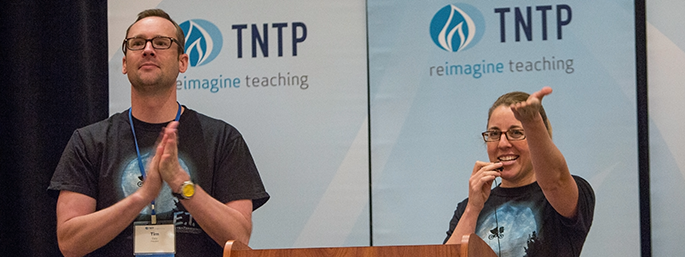This year, TNTP is embarking on a new strategy to grow its expertise and deepen its impact on public schools and students. Effective teaching has been and always will be our core focus. Going forward, we intend to build on this expertise to provide guidance and support to school systems and states on a wider range of issues, such as strong instructional strategies and supportive school environments.
As part of this long-term strategy, Ariela Rozman and Timothy Daly will transition out of their roles as CEO and President of the organization by summer 2015. Two senior TNTP executives, Daniel Weisberg and Karolyn Belcher, will lead TNTP going forward. We sat down with Ari and Tim to talk about the transition.
Why is now the right time to hand over leadership of TNTP?
As we were working on our long-term strategic plan, we realized that there probably wouldn’t be a better moment to execute a succession process. TNTP is in a strong place. We have seasoned, talented staff at all levels of the organization—the best group, top to bottom, we’ve ever had. We have successors for the CEO and president positions, in-house, with long track records of success on our leadership team. And after leading TNTP for the past seven years and working here for the past 14, we were ready to start thinking about the next challenge. With all that in mind, we saw that a transition in 2015 would make space for fresh perspectives and set TNTP up for success for the next five to 10 years.
What makes Dan Weisberg and Karolyn Belcher the best leaders for TNTP’s future?
Dan and Karolyn were easy choices to lead TNTP going forward because they’ve been our two strongest leaders in the past. Each one brings exceptional skills. In Dan, we see an ideal CEO. Since he joined TNTP in 2009 and served as the lead author for The Widget Effect, we knew he had a unique blend of big picture policy expertise and practical knowledge of the education space. In Karolyn, we have a president who brings decades of experience as an educator and incredible management skills. When we think about the issues that will be central to TNTP—the intersections of policy and practice, talented educators and rich classroom content—they bring just what we need.
What do you see as the biggest changes in TNTP’s future?
Well first, it’s worth remembering that most things will not change. We’re still going to obsess over how to attract the best people into the teaching profession, how to build school teams that enable educators to do their best work, how to retain our best practitioners, and how to ensure that low income students get more than their share of access to top notch instruction. TNTP’s focus will remain where it has been.
But there are a few issues that will likely become more prominent for us. The first is teacher learning and development. We’ve been working for several years on a research project to better understand what separates teachers who improve from those who plateau. It will be finished later this summer.
The second is our long-term support for higher academic standards. Different states are approaching this their own ways. But new standards are placing new demands on everyone who spends their days in school buildings. We want to ensure implementation yields the results we all hope to see.
And finally, we continue to look at a wider set of conditions that helps students and teachers succeed. These would include things like next generation school design and stronger partnerships between communities and schools.
What are your future plans?
TNTP remains our first priority. We’ll continue to be here and engaged until the transition work is done and done well. But once that’s complete, we expect to continue working together. We’ve been colleagues and collaborators for 14 years now. Though we are very different in our skills, we really enjoy operating as a team. It seems to help each of us do our best.
We are driven by the promise of education in our country. That’s the space we’ll continue to be in. In terms of the issues we’d like to tackle, when we look at the American educational system, it has never been more complex. Nor have the stakes ever been higher. Post-secondary completion is increasingly a prerequisite for earning a middle class living. We worry that supports for families have not kept pace. It’s very challenging for parents to navigate the educational process. They face big decisions about goals for their children, a flurry of data on performance from multiple directions, choices about which school is the best fit, and questions about how to best support education in the home. We’d like to explore what more can be done to help.
What will you miss most about TNTP?
We will miss everything about TNTP. It’s an incredible place to work. You cannot find a finer group of colleagues in education. We both started here when our team was about 40 staff and saw it blossom to almost 400, spread across 41 states. To a person, they are amazing. We love working with teachers and seeding a new vision for the profession. We feel lucky to collaborate with so many district and state leaders who devote their lives to schools, often for little praise and with plenty of drama. What has made TNTP special, and what will remain long after we’re gone, is a dogged approach to asking questions and not quitting until we can break new ground on answers. We’ve done that on the ground with our program work, in the research realm, and even in the policy arena. When we took jobs at a start-up way back in 2001, we’d never have envisioned all that.







